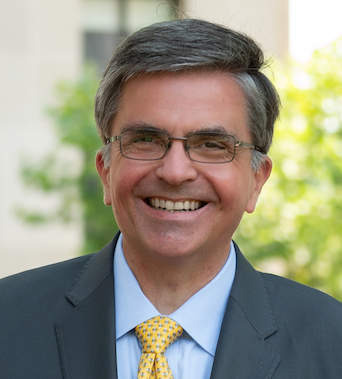Some conservative young Christian men are proposing a “reconquista” of liberalized Mainline Protestantism. The proposal was debated in a recent exchange in American Reformer. A skeptic derided the plan for wasting time with institutions that no longer matter. A reconquistador countered that conservatives too often retreat and now must, like progressives, work long-term to reclaim institutions like the Mainline. After all the Mainline has a glorious history, still has some traditionalists in its ranks, and has endowments, plus beautiful buildings, which would adorn a revived American Christianity.
As a lifelong United Methodist, I began, as a college student at age 20, representing my Northern Virginia congregation as a lay member to the Virginia Annual Conference (Methodist equivalent of a diocese or synod) in 1985. As the reconquistador noted, aging churches are anxious to elevate their rare young members. I was terribly distressed by the reflexively progressive assumptions of clergy and lay leadership at the conference level, in contrast to people I knew in my local church, who generally were more conservative.
After graduating from college, I became our congregational missions chair, and I became informed about the United Methodist General Board of Global Ministries, which had by the 1980s largely abandoned missions evangelism in favor of Liberation Theology, which included funding pro-Marxist Sandinista advocacy, among other dubious causes. With the zeal of a young man, a sort of reconquistador of that time, I made it my cause to reform the $100 million missions agency based in New York. Virginia’s bishop organized a group of us to visit the missions executives in 1989, which ended unsatisfactorily. A group of us, meeting with the bishop, organized legislation for the 1992 governing United Methodist General Conference to steer the missions agency back towards traditional evangelism.
I attended the 1992 General Conference, a tense 10-day ordeal occurring every four years with one thousand delegates and many more observers and lobbyists. And I watched as missions executives successfully lobbied to defeat the reforms threatening their policies. Progressives partly hijacked the General Conference to focus on the 1992 Los Angeles riots over the police beating of Rodney King. An attempt to pull United Methodist agencies out of the Religious Coalition for Abortion Rights failed. But progressives failed to liberalize the church’s marriage and sexuality teachings, which was always their chief focus.
Convinced that any reform of United Methodism required informing the laity, in 1994 I quit my government job to join the staff of the ecumenical Institute on Religion and Democracy as its United Methodist director to work for denominational change full-time. I did not realize it would become my career. Across 30 years I have attended all the United Methodist General Conferences, many agency board meetings, often adversarially, and have worked with all of the major evangelical renewal groups in United Methodism, which collaborated in coalition. Thanks to their work, United Methodism, almost uniquely among Mainline Protestant denominations, never liberalized its teachings on marriage and sexuality.
That will change at the General Conference this April/May, because, as the reconquistador noted, 25% of U.S. United Methodist churches, nearly all of them conservative, have quit the denomination under a temporary policy, which ended in December 2023, allowing congregations to exit with their property. (Most of seven million United Methodists in Africa likely will leave next year after the liberalization vote.) The reconquistador portrayed this massive exit as an unnecessary conservative route in contrast with progressive perseverance.
But the exit of at least 7,660 U.S. churches from United Methodism was a great victory, only possible thanks to conservative legislative wins at the General Conference. Now, traditionalists through a new Global Methodist denomination, can replant orthodox Methodism in vast swaths of America where Methodism has died, thanks to decades of progressive indifference to evangelism. The reconquistador wondered why, since conservatives won at the last General Conference in 2019 by a narrow majority, it was they who exited.
In recent years, conservatives in U.S. United Methodism only prevailed legislatively because the denomination’s membership is global, and the growing churches in Africa are strongly conservative. At the 2019 General Conference, conservatives won by 53%, but 30% of the delegate total was from Africa, without whom it would have been a progressive triumph. Although conservatives theoretically could have continued legislatively winning on sexuality thanks to African votes, the U.S. church continued to liberalize, often in defiance of official church law. Nearly all U.S. bishops are liberal, nearly all church agency staff are liberal, 12 of 13 official seminaries are liberal, most U.S. clergy, probably at least 60%, are liberal. The church in the U.S. has declined numerically every year since 1965 with no end in sight. A church poll over 30 years ago showed 69 percent of laity identified as conservative. A poll several years ago, before the exits, showed 44 percent, a plurality but no longer a majority. That number now might be down to 25% or lower. United Methodism in the U.S. has no institutional capacity to plant new churches, to reach young people, or to reach many non-white people. It’s largely content with its chronic decline. In 1968 it had eleven million. It now has under five million. Saving orthodox Methodism with any hope of renewal meant exiting the old, dying, sclerotic denomination.
Like the reconquistadors, I had hoped as a young man for reclaiming and renewing the once great historic Mainline Protestant denominations: United Methodist, Evangelical Lutheran, Presbyterian (USA), Episcopal Church, United Church of Christ, American Baptist, and Christian Church (Disciples of Christ). I worked with the often vigorous and influential renewal groups in all those churches, almost none of which still exist. Lacking the international membership and African allies that United Methodist conservatives had, the conservatives in other Mainline denominations decisively lost their votes on sexuality. Some conservative congregations managed to exit. For most of these denominations, it was under 10%. New, mostly small conservative Protestant denominations emerged from the refugees: Anglican Church in North America, Covenant Order of Evangelical Presbyterians, and the North American Lutheran Church, among others.
The Reconquista admirably wants to renew the dying old denominations. Theoretically, dedicated young people could join these churches and gain positions of influence. But how many such young people are willing to join and stay in typically small, mostly elderly congregations with often progressive pastors? The Reconquista hopes for leverage through congregations that have stayed conservative and vital, but such churches are rare. Average Mainline congregations are a mix of conservatives, progressives, centrists and the indifferent. Even conservative leaning congregations often have left-of-center pastors.
Mainline Protestant denominations had about thirty million people sixty years ago and perhaps have 12 or 13 million today. Their seminaries and leadership liberalized early in the 20th century, but conservative laity were often unknowing, liberal clergy avoided controversy, and multigenerational loyalty kept millions of members in. Now denominational brands in America are dying, and religious vitality has shifted to nondenominational evangelicalism. Thousands of Mainline churches will close in the coming years. Thousands already have. Buildings and agencies with endowments will survive, but the future is bleak.
Maybe some of the reconquistadors, during the collapse, can help small groups buy or gain by transfer some of the Mainline church buildings for new congregations. Maybe the reconquistadors can help keep the best of the Mainline Protestant traditions alive. Those traditions include liturgy, sacrament, hymnody, historic Protestant teachings, reverent worship, a patient sensibility, and a social awareness that seeks the wider public good. Reviving the denominations institutionally, barring supernatural intervention, is nearly impossible. The progressives who control them, who cannot plant new churches, or win new members, depend on these bureaucracies, funded by endowments, for their livelihoods.
Mainline Protestantism is institutionally dying. It should be honored for centuries of accomplishment that served God’s Kingdom and America. But a new chapter in American religious life is now opening. We can trust that God has good surprises ahead.






Comment by Julia Kirby on January 10, 2024 at 3:27 pm
It’s not only young men in the movement; I, a woman, am in the movement as well.
Comment by Eric Rasmusen on January 10, 2024 at 4:42 pm
The reasons to try to prevail in the mainline denominations are:
1. To save the souls of the low-information members who are being led astray by false shepherds; and
2. To get the church buildings and wealth.
3. To suppress blasphemy and impurity in The Church.
It sounds like all three are very hard to accomplish.
Comment by Mj on January 10, 2024 at 6:38 pm
My husband and I are in our twenties and we are a part of the reconquista. If my mom is sick, I want to heal her and stay with her until she dies. The church is sick. We need to stay with it and heal it and we won’t leave until the church has died. We need to strengthen the few conservative churches. Another analogy is the German occupation of France. France didn’t abandon what they had and start a “New France.” They had too much historical significance to abandon. They had to retake what was theirs. My God can heal the church. My God has made the blind see, the lame leap, and even saved me- a sinner! He can do this too. I have faith. Don’t count us out just yet. This movement has only just started.
Comment by John N Kenyon on January 10, 2024 at 7:54 pm
Every time I get soft and want to give The Beaver, Mark Tooley, a fair shake, he composes a blog worthy of a C- in freshmen composition at a junior college. Whatever this movement is out to do (and without prejudice towards it), an organization with such a broad name as the IRD might as least be informing its readers on the theology and agenda of the GMC and not this stuff. Suggestion: consider Mathew 16:18 or John 3:16. Perhaps report on the slaughter of Christians in Nigeria?
Comment by Tim Ware on January 10, 2024 at 8:11 pm
Thank you for this heartfelt article. I also read Ackerman’s article. While the factors he points to have merit, and while the goal is admirable, saving the mainline is not going to happen. It may have been possible 40 years ago, but not today. It’s too far gone.
For many years my wife and were part of a wonderfully vibrant Episcopal congregation. Then it imploded, partially over sexuality issues. Sometimes we look back on those days with such sadness because that church no longer exists. The building is there, and stuff still goes on there with a small group of people, but the church we knew no longer exists. It’s gone. They don’t even have the same kind of reverent, stately worship that used to be a hallmark of that church.
But we believe God led us down another path, as He did the others who used to go there. Maybe that church served the purpose God had in mind for it.
Maybe that’s how it is with the mainline. Maybe it served the purpose God had in mind for it, and now He needs us to go do something different.
Comment by MikeB on January 11, 2024 at 7:27 am
Christ was born in a manger.
The buildings are not needed.
Comment by Td on January 11, 2024 at 12:30 pm
The Catholic Church is still here ready to embrace any and all who are seeking the Lord. We are mourning the loss of protestant institutions who honestly were seeking truth, and we grieve especially for those Methodists that have been abandoned by their leaders.
Comment by Gary Bebop on January 11, 2024 at 12:31 pm
While this quixotic mission may be illusory, it isn’t outside the panorama of doomed tangents that make up the Christian story. There are many oddities part of any great family. We all have the crazy cousin. To be faithful to Christ in whatever circumstance you find yourself is a biblical injunction.
Comment by David D Wilson on January 11, 2024 at 1:15 pm
Mark,
Jesus said, “Let the dead bury the dead” and Paul warned against false teachers: have nothing to do with them. I am sure the Global Methodist Church would welcome you with open arms just like the ACNA welcomed me after voting to leave TEC in 2008
Comment by Tom on January 11, 2024 at 5:45 pm
The problem with reclaiming the mainline is that the liberals in charge of the mainline fight dirty–VERY dirty. Look at some of the horror stories involved in the merger of the northern and southern Presbyterian churches back in 1983 to form the current PCUSA. Time and again liberal presbyteries and synods acted in very bad faith.
Comment by Mark Smith on January 12, 2024 at 11:28 pm
The fate of the mainlines is sealed because the leadership is now more corrupt than ever, and composed largely of people who don’t really believe the basic tenets of the faith they ostensibly profess. It’s long past the time they can be reformed from within. They must be left to their own deconstruction. Orthodox congregations should shake the dust off their feet and leave, perhaps to later reconstruct on the ashes of the mainlines. Light cannot coexist with darkness.
Comment by Tim on January 13, 2024 at 9:56 am
I watched our local church go from 350 average attendance 40 years ago to 80 today. I kept thinking it is not that bad in the church so I stayed. Today, I understand why the 300 have left never to come back. And have finally left also.
Martin Luther didn’t want to leave the Catholic Church either, but was forced to. He started the Protestant revolution, but he also caused the reformation of the Catholic Church. Maybe the UMC will see someday they also need a reformation.
Comment by Richard B on January 13, 2024 at 10:37 am
It really is the spirit of Protestantism, isn’t it? But I would ask you a question… since it started with Luther trying to reform the Catholic church, then why are you not going all the way back to that? Reform or split… reform or split… reform or split… the cycle never ends, and nobody asks why.
It is because the church left off the main foundations and responsibilities. Look at the early church before it became the state church of Rome – everyone had everything common… the wealthy sold much of their goods and gave it to the church, who in turn distributed it among those who had need. It was such an effective support system, that some men stopped working because they could just live and get fed by the church, and they had to be rebuked for it. But how many in the church are struggling to pay their bills? How many wonder if they will be able to buy groceries? No one knows. The church is not fulfilling it’s responsibility towards the saints. It moans and whines about how “you must tithe so God will bless you”, but denies that the church then must tithe back to the people.
Why is the church not like this? Because they left off the order of God. Go all the way back to the Curse in Genesis 3 – God pronounced an order; but we think that we can “do church” without that order. The church breaks down the roles of men and women, and denies the place of submission that God requires. Both men and women mix their roles – even in the church. Men don’t lead. Women don’t submit to their husbands in meekness and silence. And children do not obey their parents.
The church doesn’t teach unconditional forgiveness – that without this practice, we will not be forgiven by God.
The church no longer teaches the cessation of sin; but the heresy that we cannot stop sinning.
The church is not a spiritual support system for families that are ordered properly before God – it is a religious system of disparate “ministries” that end up fragmenting the family. The church mostly hasn’t been what it was meant to be for 1700 years – it is the end result of centuries of conforming to the world. You want to “reform” and save it? Take the idea of “conservatism” all the way back to the early church… and all the way back to the curse.
Comment by Cal on January 13, 2024 at 10:37 pm
This plan might work on an individual church basis. But it would require organization and planning. Target a dying liberal church with 30 attendees, and have 40 reconquistadors join and take charge. But if you have that many likeminded people, they could just start their own church and avoid the drama.
Comment by Rick on January 14, 2024 at 10:00 pm
The church body known as the ECO Presbyterian Church is not “Evangelical Covenant Order of Presbyterians”, but (letter order notwithstanding) “Covenant Order of Evangelical Presbyterians”. Look it up: http://www.eco-pres.org
Comment by Skipper on January 15, 2024 at 10:21 pm
Exiting the UMC has been like a breath of fresh air! So nice not to bump shoulders with Progressives at church. That was so demoralizing. The old Mainline was way past the point of correcting itself. Progressives totally ignored the Methodist way of life and didn’t care what their lack of deportment did to others physically or spiritually. Yet they called themselves “Big Tent” Methodists meaning “anything goes,” especially in sexuality. They had no idea of what Methodists mean by holy living. I would not recommend to mixing with Progressives. Remember Jesus saying not to give to dogs what belongs to God. They will only turn on you. Better to seek like minded Christians. It’s so exciting to be into a living church again! A time to rejoice and thankful to God!
Comment by Skipper on January 16, 2024 at 12:14 pm
A recent article on a Progressive website speaks of balancing Scripture with your own experience and reason. How dangerous! When you put your own feelings up against the Word of God you are in danger. Lead by your own reason and feelings you are bound for trouble. So much better to be lead by God. How easily the old Mainlines like the UMC can accommodate sexual perversion for example – using their own wisdom over Scripture.
The words of Proverbs tell it well: “Do you see a man wise in his own eyes? There is more hope for a fool than for him.” Proverbs 26:12 (ESV) “The integrity of the upright shall guide them: but the perverseness of the transgressors shall destroy them.” Proverbs 11:3 (KJV) “Fools have no desire to learn, but would much rather give their own opinion.” Proverbs 18:2 (CEV)
These are strong words, but are they not needed? Again, I would recommend seeking like-minded Christians. When Progressives have grown hard in their ways it may be better to avoid the demoralizing experience of conversing with them and look for those who are more receptive to God’s Word. When we make “Scripture alone” our guide, we can be secure in our future!
Comment by David on January 16, 2024 at 12:34 pm
A lot of these young conquistadors are single with high hopes for the congregations they seek to influence. But once they marry and have children, they may have second thoughts. Would they want their children catechized by a less confessional minister or fellow lay member while they await the expected positive results of their efforts in the congregation as a whole? I doubt it.
Comment by David M. on January 16, 2024 at 7:33 pm
I share much in common with the ecclesiastical realism of Mark Tooley’s article, having watched the erosion and dismantling of the United Church of Canada, firsthand. But this much I will say to the “Reconquistadors”, your vision may happen, but can only do so (beyond the utterly miraculous) when the power and structural authority of those progressives who created this crisis has collapsed. Give humiliation forty to seventy years, then “we” shall see what the Lord and Captain of the Church will do.
Comment by Robert Sparkman on January 17, 2024 at 10:06 am
Great article! Reminding us of all the parts of the institution which would have to be recaptured is valuable. It would be impossible to do that with the seminaries even if we could have with the boards and agencies. In the meantime the conservative pastors would be under-utilized in the smallest churches the liberal establishments could find. Even if we could reform the boards and agencies, by the time we finished it the local churches would be dead.
Sometimes I dream of what could have happened if we had succeeded in reforming the old UMC. I always return to reality, realizing that it was impossible. How much better it is to start afresh! I was asked to interim pastor a church over the last year which grew for the first time in decades. The difference in the mental state of the congregation from disaffiliation to 2024 was night and day, darkness and light.
Thanks for all you have done, Mark. I remember toasting you ad your staff after the General conference where we successfully forbade the UMC and the Women’s Division from lobbying for abortion rights. You had some good victories and made a difference.
Comment by Lowell Patterson on January 17, 2024 at 8:01 pm
While taking a course on the Protestant Reformation, & the aim of the leaders early on, the Holy Sprit leaned in on me & asked “ How do you “reform” a dead carcass( Roman Catholic Church)
As this was posited to me , I was “seeing” in my mind’s eye a vision of road-kill, 3 weeks under the sun. Answer: YOU DON’T. Time for all who seek God to forsake the dead carci of denominationalism. Obviously THE POWER of God does not show up in dead churches…….
Comment by Amber on January 21, 2024 at 2:13 pm
David said above:
“A lot of these young conquistadors are single with high hopes for the congregations they seek to influence. But once they marry and have children, they may have second thoughts. Would they want their children catechized by a less confessional minister or fellow lay member while they await the expected positive results of their efforts in the congregation as a whole? I doubt it.”
This is such an important point. In my 20s and early 30s, I was happy to attend a UMC church and do what I could to push back against the progressive theology while taking part in the good the congregation was still doing in the community. I never had a chance of turning the tide on my own, but I could take the good and leave the bad. Once my son was old enough to start reading his Bible and asking questions, however, it was really hard to want to bring him to a weekly Sunday School class or have him listen to a sermon in which outright lies were being taught.
It’s also important to remember that no human institution, however historically entrenched or influential, is equivalent to Christ’s church. Abandoning a fallen, failing, heretical institution should not be equated to abandoning the Church.
Comment by Daniel Hixon on January 23, 2024 at 1:17 pm
I watched a few videos from these “Reconquista” folks and interacted with them recently. I appreciate their zeal to recover the institutional patrimony left by previous ages of the faithful. However they seemed unaware of the well-organized and well-funded work for some 40 years to “recover the mainline” that, I think it is fair to say, has largely failed. Thankfully, many local churches were able to take the buildings and assets built up by generations of faithful givers with them out of the UMC. Going forward there may be opportunities for groups like the GMC or the ACNA to buy defunct church buildings or even college campuses from declining mainline churches as a way to recover at least some of our historic institutional heritage.